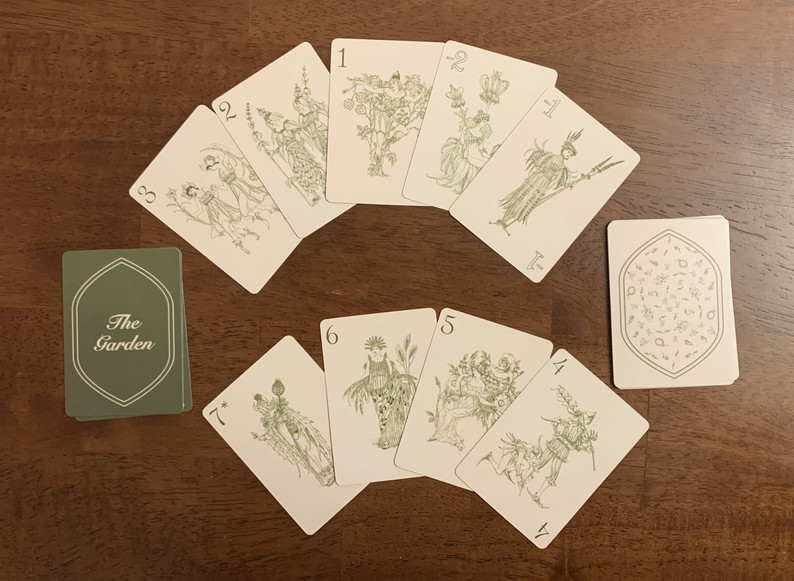The Garden: Design Diary
 The Garden is the second microgame I made. It's a classic style trick taker, in that it's very bare bones and is just about taking tricks. It's also basically a cut-down of Truc, which is a better game overall.
The Garden is the second microgame I made. It's a classic style trick taker, in that it's very bare bones and is just about taking tricks. It's also basically a cut-down of Truc, which is a better game overall.
I wish I could say I set out to understand trick taking games and carefully pried open the genre before crafting one of my own, but sadly the idea just sprang into being nearly fully formed. It's nice when that happens but at the end of the day, I don't understand trick takers on a fundamental level. From the outside in, it seems very difficult to tune the gameplay or emotional outputs of a trick taking system, doubly so for a game that is purely about the tricks and nothing else.
A trick taking system is by nature extremely unfair, and not self-balancing. A bad hand is simply a bad hand. The primary methods I've seen to resolve this are to play many many tricks in sequence, to average out the possibilities of getting bad hands. Also to incorporate betting and bluffing to bully our way out of a bad position. And of course to enmesh the trick taking system into a much larger context, where bad hands are contextual. Frequently games will use more than one of these methods.
In The Garden there are eighteen cards, two each of -2,-1,1,2,3,4,5,6,7. You have a hand of five cards and play five tricks. The winner of the trick is who played the lowest value card, and that card's value is added to a round score. After five rounds, the player with the higher round score wins one game point. In between tricks, either play may offer to wager and increase the game point payout of that round. If the wager is declined, the wagerer immediately wins the round.
There are a few fun dynamics just in the cards themselves. Obviously a -2 will win any trick, but set you back on the round score. Sometimes the flow of cards means you can score a 4 or 5. Playing (and losing the trick with) a 7 allows you to choose who leads the next trick. I've certainly lost an entire round to an opponent who scored no cards, or had a net of zero points. Unless your hand is full of negative cards or high cards, it's hard to determine how strong your position is; those two examples are in fact both pretty bad.
The betting and bluffing smooths over the hand positions, but is also the clunkiest part of the game. I generally prefer the microgames to be fully self-contained, even when it comes to noting down score, so game points are assigned as cards that are removed from the game, this could be improved by simply noting the game score on paper. The sequence of trick score to round score to game score is unwieldy, but each element is necessary.
Weirdly the hardest part was coming up for a name and theme for a purely abstract game. I started trawling public domain images for any kind of series of illustrations or images and happened upon Walter Crane's Flowers from Shakespeare's Garden. It provided a lot of good imagery and an easy, if meaningless, name.